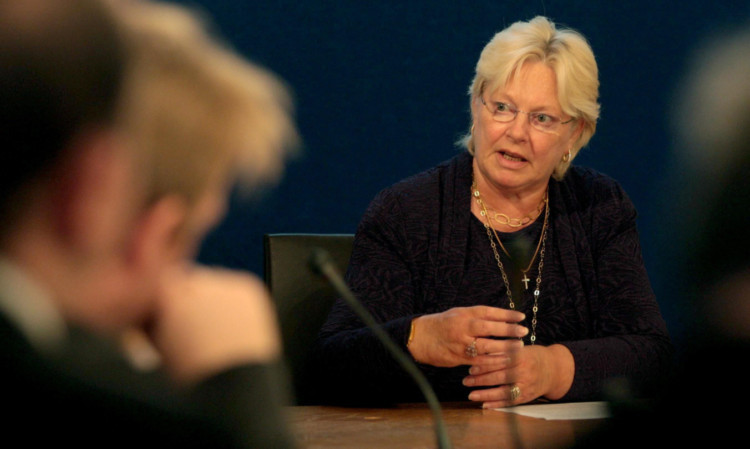As independent MSP Margo MacDonald launches another bid to get assisted suicide on the statute books, Jack McKeown and political editor Kieran Andrews examine one of the most controversial issues of our time.
You put a dog down when its quality of life becomes intolerable. Human beings have to linger on until the bitter, painful end. That, essentially, is the case in favour of euthanasia and assisted dying.
Independent MSP Margo MacDonald has long been a supporter of assisted suicide for people who are terminally ill. Yesterday saw her launch her latest bid to legalise assisted suicide.
The Lothian MSP, 70, has Parkinson’s disease and has in the past expressed a desire to choose the timing of her own death, should her condition deteriorate to such an extent that she no longer feels she has any quality of life.
Assisted dying or assisted suicide differs from euthanasia in that the patient is not killed by someone else, but rather assisted in killing themselves.
Three years ago Ms MacDonald’s End of Life Assistance Bill was defeated by 85 votes to 16, with two abstentions, by MSPs who were allowed a free vote on the legislation, rather than on party lines.
But Ms MacDonald said she hoped high-profile cases such as that of Tony Nicklinson in England, who had locked-in syndrome and battled for years for a legal right to end his life, have since increased awareness.
She also suggested that although MSPs were allowed a free vote they may have been influenced by party leadership because a Holyrood election was looming.
And she pointed to last year’s report from the Commission on Assisted Dying, which said the current system was inadequate.
Last time Ms MacDonald stood alone but her latest bill is co-sponsored by Green MSP Patrick Harvie.
“Do I think it has got a chance? Yes, I do, actually,” she said.
“I have sensed from the beginning that there was a change because of the volume of support that we can demonstrate, I am pretty sure of that.”
She added: “I believe we are probably there now.
“I know that there are people who believe that if they get to the stage where life is absolutely intolerable because of pain and indignity … they would like to end their life before nature intended and we think they should have the choice to do so.”
She is backed by the Humanist Society Scotland and was joined at the launch of the bill by advocate Niall McCluskey, retired GP Dr Bob Scott, Reverend Scott McKenna and Silvan Luley of the Swiss assisted dying organisation Dignitas.
Retired GP Bob Scott told attendees at the launch it is estimated between 50 and 100 deaths have happened in Scotland because of voluntary euthanasia by a doctor, either by providing the necessary medication or advice.
He said the Royal College of General Practitioners was split on the issue but insisted: “Although it cuts across the grain of our conditioning, some (assisted suicides) are justifiable.”
The Reverend Scott McKenna made an impassioned plea for people to support the bill, despite many religious figures objecting to its content.
“Letting people go on suffering when we have the means to stop it is immoral,” he said.
Ms MacDonald said she had made major changes to her proposals since the last bill, which failed to win enough support from MSPs in December 2010.
In particular, she said the “early warning system” should answer the concerns of those who feared people could be coerced into asking for an assisted death.
Under this provision, anyone would be able to inform their GP of their support in principle for assisted dying and a note would be placed in the patient’s file.
If and when the patient found life had become intolerable and fell into one of the categories specified, they could formally ask their GP for the process for an assisted death to be started.
A second professional opinion would be required, then there would be a 14-day “cooling off” period before the patient had to make the request again.
The doctor would then write a prescription for the medication and withdraw from the process. It would be up to a trained “facilitator” or “friend at the end” to collect the prescription.
After death the facilitator would have to supply details of the death to the police. No crime would have been committed if all of the requirements had been met.
Guidance from the General Medical Council, produced following the case of serial killer Harold Shipman, currently forbids doctors from even discussing assisted dying with patients, and many stand opposed to Ms MacDonald’s bill.
The Scottish Government has said it does not support a change in the law. The campaign against the bill is spearheaded by Care Not Killing, an alliance of individuals and over 40 organisations such as faith groups and human rights campaigners. It says the 2010 vote should have settled the matter for a generation.
Campaign director Dr Peter Saunders said: “MSPs rejected Ms MacDonald’s last attempt to legalise physician-assisted suicide and euthanasia in Scotland by an overwhelming majority of 85-16, recognising that such a move would seriously endanger public safety. Instead, they sent a ringing endorsement to making the very best palliative care widely available and accessible.
“The right to die can so easily become the duty to die and vulnerable people who are sick, elderly or disabled will inevitably feel pressure, whether real or imagined, to end their lives so as not to be a burden on others.
“The stories of incremental extension presently coming out of Belgium and the Netherlands give a stark warning about the dangers of going down this road.
“Ms MacDonald’s new proposals are effectively her old ones dished up again. I expect the Scottish Parliament to give them short shrift.”
